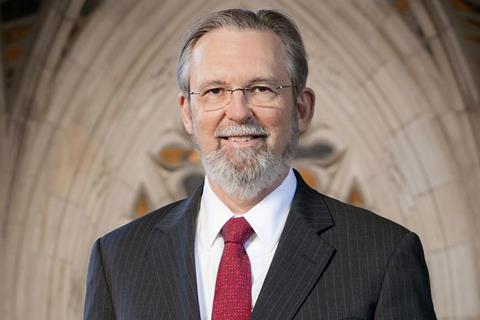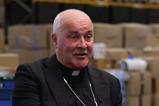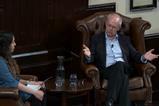Richard B. Hays was one of the most influential New Testament scholars of his generation, says Dr Ian Paul. His radical faith in Christ motivated his scholarship and led him to write a number of game-changing books

Richard Hays, who died at his home in Nashville, Tennessee on 3 January, leaves a remarkable legacy of scholarship. But there are several other things that are very striking about his life and work.
The first is the way that he came to be a New Testament scholar at all. Although raised in a Christian home in Oklahoma, as a teenager, he came to believe that those around him were hypocrites, and he turned his back on faith.
Academically gifted, he studied English Literature at Yale. There he was impressed by the famous chaplain, William Sloane Coffin, and the way that his faith was integrated with practical action in his opposition to the Vietnam War and support for Civil Rights. Back at home during the winter vacation in his second year, he returned to faith. Waiting in church for the start of the Christmas Eve service, he picked up a Bible, and opened it at random to Mark 8:35: ”For whoever wants to save their life will lose it, but whoever loses their life for me and for the gospel will save it.”
“Bang! That hit me right in the chest…and stunned me into offering my life to Jesus,” he later recalled.
Following his conversation, he enrolled to study theology - but was again put off by what he saw as careerism in his fellow students. He moved to Massachusetts with his wife Judy (whom he had known as a teenager) and taught English at High School. There, he joined an intentional Christian community who shared life together - daily meals, prayer, common expenses - and read Bonhoeffer’s Life Together, trying to live out its practices. From there, Hays commuted to Yale Divinity School and completed an MDiv part time. So his way into scholarship was from a radical commitment to distinctive Christian community, and seeking the theological basis for that.
A theological artist
The second thing that is striking about Hays is that he did not actually write many books. In contrast to scholars who manage to produce books year in, year out, Hays’ output was modest - but each of his books was a game-changer.
His PhD at Emory University was published in 1983 as The Faith of Jesus Christ and reissued in 2002; it is highly unusual for a dissertation to become a standard text like this. Hays engaged with a major question in Pauline scholarship: is Paul’s phrase ‘the faith of Jesus Christ’ about our faith in him, or his faith(fulness) towards us? Hays’ analysis of Paul’s narrative argument in Galatians argued for the latter, and it shifted the dial on the debate.
Hays then returned to Yale to teach New Testament, and in 1989 published Echoes of Scripture in the Letters of Paul. This engaged another major issue in scholarship: Paul’s use of the Old Testament (OT). It is commonplace to observe that Paul uses OT texts in a way that the OT writers might not have intended, and without asking the modern questions of context, intention, and so on. So is Paul just quoting at random? No, said Hays: he is reading theologically, and drawing on the story of the Old Testament to explain the meaning of Jesus. As Hays put it, “Paul, groping to give voice to his gospel, finds in scripture the language to say what must be said.”
Drawing both on his deep familiarity with the Greek of Paul’s writings, and his attention to questions of literary design, he countered both sceptical rationalist readings and the pious assumption that Paul was a unique reader of the OT. And he contributed to the growing consensus around the Jewishness of the early Christian texts, against the inherent anti-semitism of much German scholarship from the 19th century.
In his tribute to Hays, fellow Christian and scholar Wesley Hill said, “Hays’s portrayal of Paul as a subtle theological artist who summoned Old Testament cadences and sagas in order to substantiate his message about Christ changed the face of Pauline studies.”
Changing his mind on sexuality
His third major contribution was quite different. In perhaps his most well known work, The Moral Vision of the New Testament, he tacked another issue: despite its diversity, does the New Testament offer a coherent vision of the Christian life which offers real guidance on ethical issues to the contemporary church? He answer was a resounding ‘yes’ - but only when we attend to the central unifying themes of the New Testament writers around ‘community’, ‘cross’, and ‘new creation’. The death (and resurrection) of Jesus is the decisive centre, and this work of God forms a new people who live in hope for his return and the renewal of creation.
The best-known chapter in the book was on homosexuality, and Hays begins and ends the chapter with reflection on his deep relationship with a gay Christian friend, highlighting Hays’ integration of scholarly engagement with the text of the NT and practical issues of Christian living and devotion.
His final book, The Widening of God’s Mercy with his son Christopher Hays (an Old Testament scholar) hit the headlines last year, as in it he appeared to change his position on the question of same-sex relationships. The book argued that, in the Old Testament, God appears to change his mind, and that he is constantly broadening the range of those included in receiving his mercy, so that this should lead us to change our view on the nature of marriage so that it now includes those of the same sex. Few readers have found this persuasive, including those who agree with the ethical conclusion. The OT argument is weak, and would imply that God is not consistent, and that scripture is not a reliable source for Christian ethics. And Richard Hays himself commented that he had not changed his mind on what the NT texts actually say from his position in Moral Vision.
A faithful friend
The last distinctive mark of his scholarship was his continued commitment to living out his scholarship in practical Christian discipleship.
Ordained as a Methodist, he preached regularly in local churches throughout his life. At Yale and Duke, he was known, according to L. Gregory Jones, as: “a brilliant classroom teacher, a superb mentor of doctoral students, a deeply committed colleague, and, for those privileged to know him [more intimately], a faithful friend who embodied great wisdom.”
One of his formal doctoral students put it simply: “The main thing to say about Richard is that he was a real Christian.”
Hays had been diagnosed with pancreatic cancer nine years ago, and after a period of remission, it returned last year and led to his death. But the conviction from which his academic work sprang - the holding together of faith with scholarship - continued to mark his life to the very end.





































No comments yet